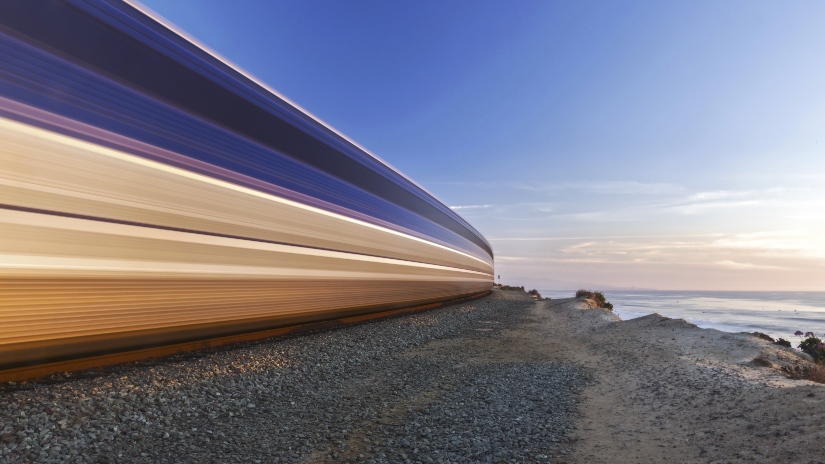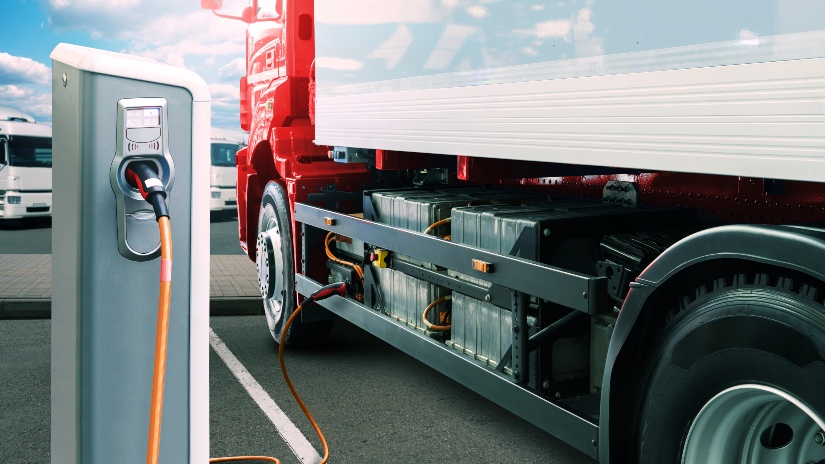The contents of this article were published in August 2022.
By Hicham Abdessamad, Chairman & CEO of Hitachi America, Ltd. and Corporate Officer for Hitachi, Ltd., and
Andrew Barr, Group CEO of Hitachi Rail
Accessible, sustainable and affordable mobility options are key to providing a better quality of life for all Americans. The challenge of creating sustainable transportation that offers real choice in the United States is formidable, but several recent trends are paving the way.
First, the 2021 Infrastructure Investment and Jobs Act officially became law on November 15, 2021. It focuses significantly on the transportation sector, which accounts for 27% of all greenhouse gas emissions in the United States.1 This bill provides a once-in-a-generation level of investment for the nation’s infrastructure, including sustainability and modernization initiatives that address the climate change crisis, improve the country’s transportation systems and invest in communities. It also challenges the assumption that Americans should settle for less than the rest of the world when it comes to their rail travel. It recognizes that efficient, reliable mass transit is critical for cities across America to tackle congestion, pollution and carbon emissions.
Second, several technological advances are emerging to support more affordable and sustainable transportation. For example, manufacturers such as Hitachi have developed more efficient components and systems for electric vehicles (EVs) and are working to expand and modernize the grid that will power these vehicles. Additionally, innovative new business models and technologies in the manufacture and deployment of rail are making public transportation options more cost-effective and attractive.
Finally, investment in transportation means investment in American jobs. Hitachi Rail is building a state-of-the-art factory that will sustain a total of 1,300 jobs, of which 460 employees will work for Hitachi Rail at the site. These 1,300 jobs – direct, indirect and induced – will command total earnings of $350 million per year, which will bring major economic benefits to DC, Maryland, and Virginia. These jobs will be added to the 1,400 it employs across North America, in addition to the huge number of workers employed through a complex and high value supply chain.2
Hitachi has extensive experience working with operators, cities and governments in the U.S. and around the world to deliver mass transit solutions. We’re building new railcars for Washington and Baltimore and upgrading rail infrastructure in San Francisco and in the Northeastern U.S. These projects work in partnership with our business that spans the rest of the world to ensure our customers have access to the latest technology. In addition, to be a global leader in rail travel – the most sustainable mode of transport, Hitachi’s work on EV technology and power grid expansion supports Hitachi’s commitment to becoming a climate change innovator.

Rail provides many benefits over on-road transport, including lower fuel consumption and emissions, less road congestion, fewer fatalities and reduced public infrastructure costs. Not only does the U.S. have the world’s largest freight rail system, but passenger rail services are essential across the country, particularly in dense population centers. Now, the government is investing in modernizing rail transportation and increasing sustainability. The public transit in the U.S. has also seen an increase of 52% in rail ridership in the last 20 years3, and Hitachi Rail is at the forefront of providing better rail services, with more capacity, reach and reliability in towns and cities up and down the country.
For example, Hitachi Rail projects in regions across the United States are delivering new train control systems, providing state-of-the-art rail cars and deploying a driverless rail metro system. In one high-profile project, Hitachi is helping modernize the San Francisco Bay Area BART system with digital train control technology, which will increase capacity more than 40%, directly contributing to more accessible, affordable transportation for Bay Area residents.
For passenger rail, modernization improves service and encourages the use of public transport, which saves resources, reduces congestion, improves safety and cuts emissions. It also saves money — for example, in 2019, highway congestion cost the U.S. $190 billion in lost productivity, with passengers in New York sitting in their cars for nearly 100 hours per year.4
And rail is already three to four times more energy efficient than trucks for freight — it moves about a third of all inter-city freight while producing only 2% of total transportation emissions.5 Battery-powered trains, digital controls and smart sensors such as those being introduced by Hitachi will further improve efficiency.

EVs are integral in the transition to sustainable transportation. Hitachi has been deeply involved in developing direct EV technologies, as well as working across the chain of materials, manufacturing and maintenance.
Although most EVs have zero tailpipe emissions, they are only as “clean” as the energy that runs them. How is that energy produced, how are the battery materials mined and transported, and how are the EVs and charging stations manufactured? Hitachi is developing solutions that sustainably address these questions as part of our long-term commitment to support carbon neutrality — a commitment solidified in our pledge to be carbon neutral across our own value chain by 2050.

Infrastructure is critical for broad EV adoption. At Hitachi Energy, we are developing scalable, digitized charging architectures to make commercial fleets more efficient. We work with corporate partners on delivery fleet efficiency, and with municipalities on public transit electrification and smart city solutions that reduce traffic and improve parking and safety.
Electrification can provide additional economic benefits, and Hitachi Energy is committed to supporting the electrification of the Americas transportation, building and industrial sectors by developing technologies designed to make the energy system more sustainable, flexible and secure.
At Hitachi, we believe that digitalization is critical for developing sustainable transportation. Many solutions related to sustainable rail, EVs and their value chains require significant digital technology. By continuing to work with our customers and partners, we can develop and implement digital solutions that bring the vision of “transportation for all” to fruition.
Chairman & CEO of Hitachi America, Ltd. and Corporate Officer for Hitachi, Ltd.
Hicham Abdessamad currently holds roles as Chairman & CEO of Hitachi America, Ltd. and Corporate Officer for Hitachi, Ltd.
As Chairman & CEO of Hitachi America Ltd., Hicham’s responsibilities include leading Hitachi America in achieving its business growth objectives and delivering on Hitachi’s social innovation mission to provide social, environmental and economic value for our customers, partners and ecosystems. This includes ensuring all North American Hitachi Group companies continue their growth trajectory across Hitachi’s key business sectors, including Digital, Sustainability, and Innovation. Other responsibilities include providing oversight as Hitachi Corporate Regional Head of Risk Management and supporting various Hitachi Group Corporate and strategic initiatives.
One of Hitachi America’s key growth areas is the Environment Business Division, with an emphasis on environmental and sustainability solutions. This division is focused on delivering a portfolio of transformational business solutions, leveraging Hitachi’s expertise in digital technology, energy, transportation and industrial capabilities while executing on a mission of powering good, driving meaningful business outcomes and fostering a sustainable society.
Prior to his current role, Hicham held multiple senior executive roles within Hitachi including CEO of Hitachi Digital (previously Hitachi Global Digital Holdings), President and CEO of Hitachi Consulting and Deputy General Manager of Hitachi’s Social Innovation Business Division.
Hicham holds a Bachelor of Science degree in Computer Engineering from Suffolk University, Massachusetts, and has completed the Executive Development Program at the Tuck School of Business at Dartmouth College in New Hampshire, and the Executive Leadership Program at the International Institute of Management Development (IMD) in Lausanne, Switzerland.

Group CEO of Hitachi Rail
Andrew Barr is Group CEO of Hitachi Rail, a global, full-service provider of rail services and products, with a presence in 30 countries and over 14,000 colleagues.
Starting his career in rail in 1990 with London Underground Limited, Andrew held posts with UK train operator GNER, at Bombardier Transportation and with the Strategic Rail Authority.
He has worked for Hitachi for seventeen years, joining as Head of Maintenance Delivery and later COO at Hitachi Rail Europe, and then following acquisition, CEO of Ansaldo STS, based in Italy. Andrew returned to the UK in 2019 to take up his current role as Group CEO of Hitachi Rail.
Andrew holds a BSc (Hons.) in Manufacturing Technology and Management from Brunel University and is a Member of the Institution of Mechanical Engineers.